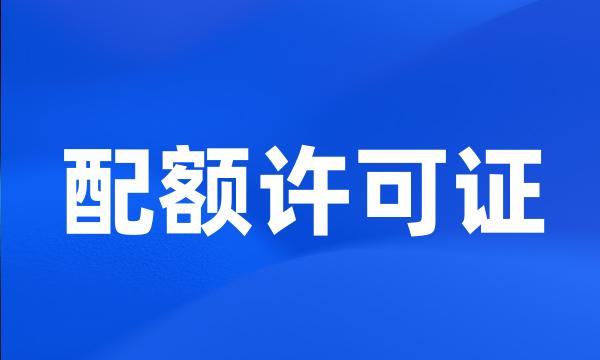配额许可证
 配额许可证
配额许可证-
2006年实行出口许可证管理的46种货物(312个8位HS编码),分别实行出口配额许可证、出口配额招标和出口许可证管理。
There are46 commodities subject to export license in2006 ( 312 HS codes of8 places ) . They are separately subject to export quota license , tender of export quota and export license .
-
配额许可证:货物可以在加工区和其他国家之间自由进出。
Quota license : products may pass through between the Processing Zone and other countries without hindrance .
-
外经贸部配额许可证事务局(以下简称“许可证局”),经外经贸部授权,系纺织品配额签证机关。
The Quota License Affairs Bureau under the MOFTEC ( hereinafter referred to as " QLAB ") is the issuing authority of textile quotas authorized by the MOFTEC .
-
尽管GATT和WTO原则上都反对以配额、许可证等形式限制货物进口,进口许可制度因其固有的特征仍将长期而普遍地存在下去。
Although GATT / WTO is against restriction on imports by means of quota or license , ILS will prevail for good .
-
WTO后,在关税减让、配额和许可证管制放松以及专卖专营制度逐步取消因素的影响下,国内卷烟市场将进一步开放,烟草行业不可能再完全信赖国家烟草专卖制度的支持和保护。
After the WTO , under the influence of factors that tariff concession , quota , licensing system loosening and monopoly sales canceling gradually , domestic cigarette market open further , tobacco trade can 't rely on the support and protection of national tobacco 's monopoly system totally .
-
除国家另有规定外,不需配额和许可证。
Quota licenses are not needed except for cases otherwise regulated by the nation .
-
配额和许可证应在不迟于该申请期结束后60天分配给申请者。
Quotas would be allocated to applicants no later than 60 days after closure of the application period .
-
对限制进口或者出口的货物,实行配额或者许可证管理;
Goods whose import or export is restricted shall be subject to quota and / or licensing control .
-
成品油进口实行配额和许可证管理,并实行国营贸易和非国营贸易。
The quota and license management system pertains to the import of oil products , also covering both state-owned trade and non-state-owned trade .
-
政府的公共行为具有强制力,能人为的制造稀缺,如政府的特许、配额、许可证、审批等。
The public behaviors of government are compulsive and they are able to create rare artificially , suck as license , quota , examining and approving of government etc.
-
随着国际贸易中关税、配额、许可证等传统贸易调节手段的不断削弱,技术因素对贸易的影响日益明显。
Since the functions of traditional means , tariffs , quotas and licenses , in international business control are weakening , the technical factor in trade becomes more and more popular .
-
随着多边贸易体制的不断发展和完善,关税、配额、许可证等传统的贸易手段受到了越来越严格的约束。
With the development and perfection of multilateral trade system , traditional trade measures , such as tariffs , quotas , import licensing and so on , are more and more strictly limited .
-
入世后,在关税减让、配额和许可证管制放松等因素影响下,国内卷烟市场将进一步开放,中国的烟草行业必将受到很大的冲击。
With its entering WTO , China 's tobacco market will further open up and tobacco industry will suffer from great impact due to tariff concessions , relaxing controls of quota and license granting and other facts .
-
入世后,配额及许可证等非关税措施将逐步取消,关税也要相应地降低,国内产业将面临进口产品越来越大的竞争压力。
After joining in WTO , quota , import license and other non-tariff barriers will be broken down step by step and the tariffs will be reduced . Our domestic industries especially infant industries will face more and more competition .
-
10年来,我们全面履行诺言,逐步降低进口产品的关税税率,取消所有进口配额、许可证等非关税措施,全面放开对外贸易经营权,大幅降低外资准入门槛。
Over the decade , we have completely fulfilled our commitments by gradually lowering tariffs on imported goods , abolishing all import quotas , licenses and other non-tariff measures , liberalizing access to foreign trade operation , and substantially reducing the threshold for foreign investment .
-
我国加入WTO以后进一步降低关税,消除诸如进口配额、进口许可证等数量限制措施,外国商品和服务的大量涌入将不可避免。
Entrance into WTO , China further falls tariffs and eliminate quantitative restriction measures such as import quota and import license , so it is unavoidable for foreign commodities and service to swarm into our markets .
-
较为普遍的出口限制措施主要有出口税、出口配额、出口许可证、最低出口价格等。
The commonly adopted export restrictions are export taxes , export quotas , export licensing , the minimum export price .
-
技术性贸易壁垒由于自身的灵活性和隐蔽性,成了继关税保护和配额制及许可证保护后最难对付的贸易保护主义手法,也成为近年来发达国家限制进口的最常用手段。
Because of its flexibility and invisibility , technological trade barriers have become the most usual protectionism practice among developed nations .
